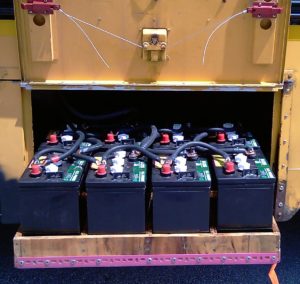Electrical Energy Storage
The vast majority of deep cycle batteries on the market today are lead acid batteries. Lead acid batteries can be recycled at a rate of 98% by volume, 99.5% by weight. The plastic cases, lead plates, sulphuric acid, solder, and other metals are 100% recovered for reuse. Only one portion of a battery is not recyclable: the paper separators that wrap the plates. Due to the acid bath the paper sits in, the fiber length is reduced so far that it can not be rewoven. Industry wide, there is a 97% rate of recovery on all lead acid batteries sold in the United States, resulting in a virtually closed manufacturing cycle.
 Deep Cycle Batteries
Deep Cycle Batteries
A good deep cycle battery is designed to drain to around 20% of it’s total capacity, unlike car batteries which are designed to produce high amp power for very short periods of time, and are inappropriate for long term storage. However, they are still useful in a pinch, and for things such as powering tools, welders etc.
//under constructiom
